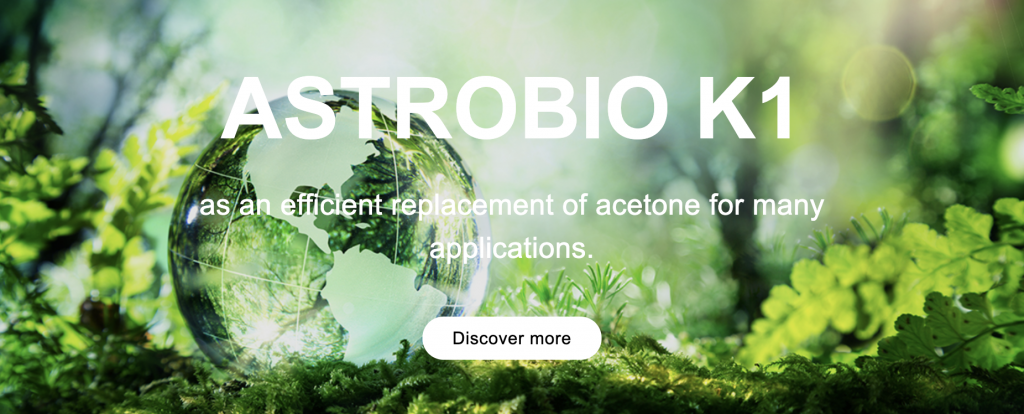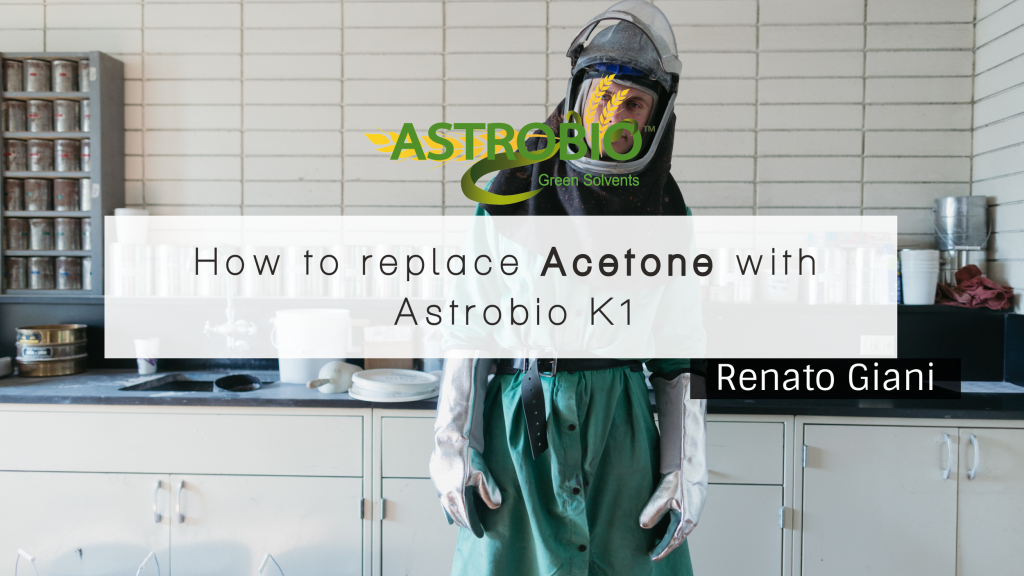Acetone, also called propanone (CAS n.: 67-64-1), is a well-known solvent, very widely used for many applications.

Acetone formula
Largest ones are all cleaning operations on every type of industrial machinery or materials, but it’s also pretty common in cosmetics formulations, like nail polishers, or is used for thinning paints and resins.
On the basis of our expertise on bio-based solvents, we have developed and we are distributing our ASTROBIO™ K1 as an efficient replacement of acetone for many applications.
ASTROBIO™ K1 doesn’t contain ketones and is largely based on molecules coming from the fermentation of carbohydrates contained in vegetal kingdom.
Why to replace Acetone?
There’s plenty of reasons why companies should replace acetone. Here’s below you can find some of the most important ones.
First of all, acetone is extremly flammable chemical, very volatile and is especially dangerous when ingested. Anyway, even breathing moderate levels of acetone for short periods of time can cause:
- nose, throat, lung, and eye irritation,
- headaches and fatigue,
- drowziness or dizziness.
Flammability
Perhaps this is the main drowbacks of acetone: it has a flash point of -17° C.
Yes, you read the right number!
This means that acetone’s vapours can ignite, if subjected to an ignition source, at a temperature of -17° C.
Pretty impressive, don’t you think?
Because of this high risks, acetone must be stored in a proper environments: e.g. no sources of ignition have to be present.
Acetone’s storage needs to be away from sparks, flames, or unexpected arc flashes.
On the other hand, ASTROBIO™ K1’s flashpoint is + 4° C: 21° C higher than acetone, with a great benefit on the safety of storage and handling.
Even if they are both classified as flammable (H225: higly flammable liquid and vapour), I am sure you’ve understood the great benefits that ASTROBIO™ K1 can gives.

Volatility
It’s undenaible: acetone is one of the most volatile solvents on the market with a vapour pressure of 24 kPa at 20° C (source ECHA).
While for some application this is maybe a good thing, for many others it’s defenetly not.
I’m sure you’ve often found yourself in the following situation: you are trying to clean industrial machinery parts with acetone and, althougt its very good solvency power, you are not able to perform the cleaning as you wish.
As a matter of fact, cleaning operations can be tricky if the solvent you are using (i.e. acetone) evaporates in a few seconds (or minutes) after application.
This kind of behaviour inevitably leads to an increase of solvent consumption and can cause you to spend (i.e. lose) much more money than expected.
Now, imagine to use a solvent (i.e. ASTROBIO™ K1) with the same solvency power of acetone, but with a lower vapour pressure.
It means you can use less of it to obtain the same results.
ASTROBIO™ K1 stays on the job longer than acetone.
Unexpected evaporation will no longer be a problem and cleaning procedures will be a lot more efficient.
Other benefits of ASTROBIO™ K1: acetone’s replacement.
In house testing showed us that ASTROBIO™ K1 is 20% -30% more efficient in reducing viscosity than acetone.
Plus, ASTROBIO™ K1 degreasing power has been proved to be comparable and even superior to acetone one in many applications.
Morover, ASTROBIO™ K1 is made totally with readily biodegradable raw materials, while other environmental benefits can be listed as follow:
- slow climate change: carbon neutral balance,
- sustanable chemistry: made with renewable raw materials,
- no ozone depleting chemicals (ODC),
- no environmental hazardous ingredients,
- no hazardous air pollutants.
Last, but not least, ASTROBIO™ K 1 price is very stable, not depending on crude oil fluctuations.
Don’t you want to test a sample?
What are you waiting for?
Dozens of companies around EU had already replace acetone with the more efficient ASTROBIO™ K1.


